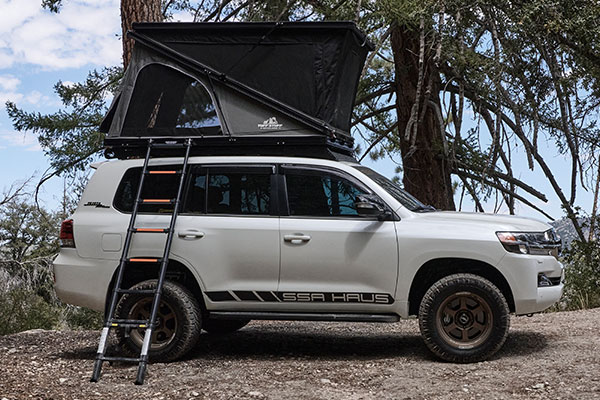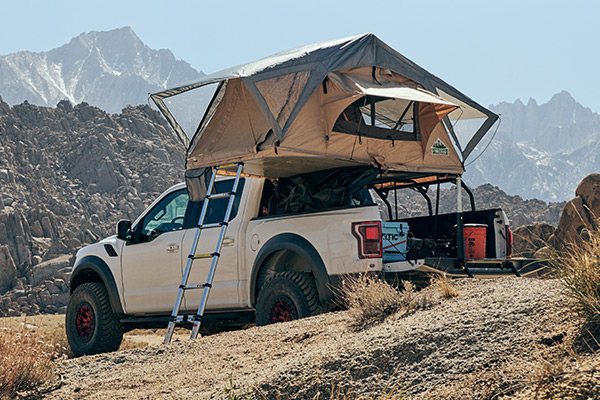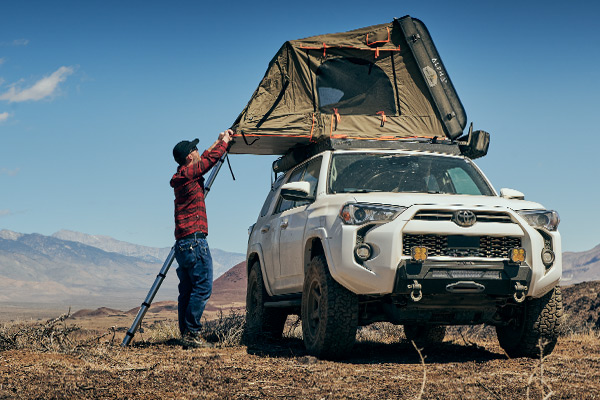Rooftop Tents; Frequently Asked Questions (Answered)

Reprinted from Tuff Stuff Overland (Blog)
Although rooftop tents are rapidly becoming mainstream camping gear, to some people, there still are many mysteries concerning how this essential gear works. Some popular questions people are concerned about are how to choose a rooftop tent or even what type of tent to choose.
In this article, we will address popular rooftop tent questions to help you make the most of rooftop tents.
Rooftop Tent Frequently Asked Questions and Answers:
Rooftop tents have grown to be an integral part of camping as more and more people make the switch from regular traditional tents to these more modern options. In fact, ever since rooftop tents entered the market a few years ago, their demand has continued to increase, and the market has gone nowhere but up.
And for great reasons too!
Investing in a rooftop tent is an excellent option when you are constantly in pursuit of one outdoor activity or the other. It is a great way to make your camping or overlanding trips more convenient while enjoying the luxury many other ground texts do not offer.
Rooftop tents are rapidly gaining popularity, but many people still have many questions that fuel their skepticism about switching from traditional tents to rooftop tents. If you are among the many people who have questions about rooftop tents, we are here to help!
Below, we have compiled a list of possible questions you might have and detailed answers to these questions.

1. How do I make a rooftop tent more comfortable?
Your rooftop tent is your home away from home and should be made as comfortable as possible. Some easy ways you can do this include:
Invest in a high-quality waterproof mattress
Buying absorbent sheets and connection mats to keep wetness out
Buy comfortable pillows
Buy a rooftop tent in the correct size
Bring a ground mar with you on camping trips to keep the mud out of your tent
Light up your tent with power-saving LED lights
Keep your tent cool with a cooling fan
Use mosquito nets for protection.
2. How much does a rooftop tent weigh?
A rooftop tent’s weight depends on the materials it is made out of and its size. Generally, rooftop tents weigh between 100-200lbs.
3. How much weight can a rooftop tent hold?
A rooftop tent’s weight capacity varies with the type of tent. On average, rooftop tents can hold 200 lbs per occupant.
For example, the Tuff Stuff Alpha II Hard Top two-person tent has a weight capacity of 800 lbs, while the Tuff Stuff Ranger three-person tent also holds 800 lbs.
4. Where can I camp with my rooftop tent?
There are many advantages of rooftop tents, and one essential one is the ease of camping anywhere.
You can camp anywhere your vehicle goes! It doesn’t matter if you find yourself in the desert or on a grassy plain, as long as you find a safe and legal place to park your vehicle, you can use your rooftop tent.
5. How can I level a rooftop tent?
An uneven rooftop tent can be very uncomfortable and frustrating. To make the most out of your text and enjoy a comfortable night’s rest, you need to level your RTT. To do this:
Choose a flat place to park your vehicle. If camping uphill, find an area with only a slight incline to pitch your tent.
Level your vehicle, not just your tent
Use leveling blocks if necessary. Use rocks if you don’t have blocks
Position your rooftop tent ladder toward a hill.

6. How do I keep a rooftop tent warm?
A chilly tent is uncomfortable. However, sometimes it can not be avoided, especially when camping in the winter.
To keep your rooftop tent warm:
Use insulation
Invest in electric blankets
Use a portable heater
Buy an insulating mattress
Use diesel-powered heat exchangers (you can also create your diesel heater!)
7. How do rooftop tents work?
Rooftop tents are camping gear fitted to, you guessed right- the roof of a camping vehicle. However, some rooftop tents are also fitted to the bed of a motor vehicle.
Rooftop tents were designed to offer shelter like regular camping tents but in a more convenient, comfortable, and safer structure. With standard tents, your tent is on the ground, but with rooftop tents, your shelter is atop your vehicle.
8. Why are rooftop tents highly sought after?
There are many reasons people choose to switch their traditional camping tents to rooftop tents. Although rooftop tents are generally more expensive than conventional tents, they offer more game-changing benefits that many campers find essential to their outdoorsy lifestyle.
Some of these benefits are:
Easy set-up and pull-down
Ease of mobility as you can camp wherever you go with your vehicle
You can make the most of your vehicle space with your rooftop tent installed on top of your car.
Many rooftop tents are made of more durable materials (like aluminum) than some traditional tents.
Better sleep off the ground, you do not have to deal with rocks poking into your back as you sleep, water pooling in your tent as it rains, or mud splashing all over your tent.
They offer a vantage point of the ground which keeps you out of reach of animals like snakes creeping into the camping area.
9. Will installing a rooftop tent damage my vehicle?
When appropriately installed, rooftop tents do not pose a risk to a vehicle’s roof. Rooftop tents are installed using roof racks or rooftop bars. The tent is not placed directly on the roof of the vehicle. Of course, rooftop tents are heavy, so your concerns are valid. However, if you stick to your vehicle’s and roof rack’s weight limit, you should have no problem using a rooftop tent.
10. How do I know my vehicle’s weight limit?
Although a vehicle’s weight limit is an overlooked feature, it is one of the many important factors to consider when installing a rooftop tent. Your vehicle’s weight limit determines how safe it will be to install a rooftop with a certain weight.
Your vehicle’s weight limit is categorized into static and dynamic weight. Static weight is your vehicle’s weight capacity when it is immobile. It is how much weight your vehicle can support when it is not moving.
The static weight capacity is often at least three times the dynamic weight capacity. To know if your rooftop tent is suitable for your vehicle, ensure that the tent’s weight and your weight is less than the static capacity figure.
For example, many SUVs have a static weight capacity of more than 1000 pounds. If your rooftop tent weighs 250 pounds, you must ensure that the combined weight of you and your camping company- and your camping gear- is less than 600 pounds.
On the other hand, dynamic weight capacity is how much weight your vehicle can support when in motion. Your rooftop tent’s weight should not exceed this weight limit.
You can find your vehicle’s weight limit by talking to your dealer or checking your manual. Either way, you must factor these numbers into your rooftop tent needs.
11. Will any roof racks do for my rooftop tent?
No! You should never purchase a roof rack for your rooftop tent without ensuring it has the correct specifications.
Some vehicles come factory-equipped with roof racks pre-installed. You might think you do not need to purchase another roof rack, but this isn’t the case. Pre-installed roof racks are not strong enough to support rooftop tents.
So, what roof racks should you buy?
There are different types of roof racks with other specifications. The roof rack you should buy depends on your vehicle type and rooftop tent requirement.
Many rooftop tent manufacturers often detail the best rack fit for their different rooftop tents, so this should not be a problem. They usually offer a guide so you know the correct roof rack weight limit, material type, length, and breadth is perfect for you.

12. Can my pet sleep in a rooftop tent?
Yes, your pet can sleep in a rooftop tent! Many rooftop tents are animal friendly and are comfortable for human and pet campers. All you need to do is find a rooftop tent that will hold you and your pet(s) comfortably and probably invest in a rooftop tent ramp to help your pet get up and down the tent quickly.
13. How do I store my rooftop tent when I’m not camping?
Many people wonder what to do with their tents when taking a break from outdoor activities. While some people prefer to leave their rooftop tent installed on their camping vehicle, we do not recommend doing this. Like regular camping tents, rooftop tents need to be stored properly to ensure it retains their durability and is in an excellent state for your subsequent camping trips.
One common misconception that people have about storing rooftop tents is they can leave them lying on the floor. However, this is not a practical option, as even if the floor is dry, small amounts of moisture can still find their way into your rooftop tent. This poses a high risk of degradation and can damage your tent.
So what are the best ways?
Flat on the garage floor: Instead of placing the tent directly on the floor, create a wooden platform and set the tent on it. Remember to store the tent and accessories in an airtight bag or thick blankets.
Lean it against a wall: this option is best if you do not have enough garage floor space. Create a stable platform along the bottom of the tent. Place the tent’s base on the wall and lean the top part against the wall. For added security, use ties to support the rooftop tent to the wall.
On the ceiling: Using a pulley system, you can store your rooftop tent overhead. This method saves space but will require more effort and financial investment than previous options.
Use a cart: Do you have a cart-like structure that your roof-top tent will fit in? Try storing your tent in it!
14. What size tent should I buy?
Rooftop tents are long-term investments which is why you should buy a rooftop tent that will serve you for years. This means you should take in several factors, like the tent size.
There are one-person, two-person, and even five-person rooftop tents with varying weight capacities. When choosing the size to buy, you should consider if you will be camping alone or will have companions with you. If you are not sure, you can “size up”! After all, it’s better to be stuck with a bigger rooftop tent than a small one.

15. How do I clean my tent?
Maintaining a rooftop tent is easy. Ensure you never store it wet, and remember to clean out all dirt on or in it.
To clean your rooftop tent, remove all your sleeping gear. Clean the tent’s floor or base and air out the tent. Depending on how often you use the tent, deep clean your RTT to eliminate build-up. Remember to let it dry properly before putting it in storage.
16. Will installing a rooftop tent affect my vehicle’s mileage?
Any car owner’s primary concern about installing a rooftop tent is how it affects mileage. After all, an object that is bulky on the roof of a vehicle is bound to create a drag effect.
A study shows that even roof racks impact fuel consumption. So, will rooftop tents do the same?
The short answer to this question is yes. Yes, installing a rooftop tent will affect your vehicle’s mileage. However, there is no specific formula you can use to calculate how much change in mileage occurs. To make it easier, we have provided all you need to know about how much rooftop tents affect gas mileage in this detailed article.
17. Will installing a rooftop tent affect my speed?
No, it doesn’t. Installing a rooftop tent does not affect the overall performance of your vehicle when it comes to speed. However, it would help if you kept in mind that this depends on your vehicle’s capacity. It is also important to remember that going too fast while a rooftop tent is attached to the roof of your car will increase your mileage.
18. What kind of vehicle can I install my rooftop tent on?
There are so many vehicles out there, so it can get confusing trying to figure out if a rooftop tent can fit on your car. As an unspoken rule of thumb, RTTs are more commonly seen on SUVs and trucks. However, theoretically, any vehicle with a dynamic weight capacity of over 165 pounds and can fit the necessary roof racks can hold a rooftop tent. Regardless, rooftop tents are more commonly seen on off-road capable vehicles.
19. Should I buy a soft-shell tent or a hard-shell rooftop tent?
Both types of rooftop tents are great options. However, it would help if you considered your needs before choosing one.
Hard-shell rooftop tents are more compact and have smaller weight capacities. However, they are also more aerodynamic, durable, and easy to set up.
On the other hand, soft-shell rooftop tents are usually bigger but less aerodynamic and more challenging to set up.
Weigh your options and see which rooftop tent type best suits your lifestyle!
20. How long do rooftop tents last?
Rooftop tents are more durable than regular ground tents. When well maintained, you should be able to enjoy using your RTT for at least five and as much as ten years.
21. Should I leave my rooftop tent on my vehicle in the winter?
Unless you are camping in the winter, it is not advisable to leave your rooftop tent installed on the roof of your vehicle. Leaving your rooftop tent installed on your cars throughout the cold months can cause moisture to seep in. This moisture can be challenging to expel during the winter and damage your RTT.
Additionally, unless you plan to abandon your vehicle with the RTT installed, there is no point driving around with the tent installed. This will increase your mileage.
22. Can I drive my vehicle through an automated car wash with my tent installed?
No, you should not. This can damage your rooftop tent.
Rooftop Tents are the New Way!
Although rooftop tents are growing increasingly popular, they are still relatively new to the camping scene. As a camper used to ground tents, it is normal to be skeptical about making the switch to rooftop tents.
However, ever since it became a mainstream camping gear, rooftop tents have offered nothing but benefits. Rooftop tents have consistently proven to be better options than regular rents.
To help you make the easier choice, we have provided an answer to all the questions you possibly have. With this article, we hope you are finally confident in the knowledge you have of rooftop tents.
FIND YOUR ROOFTOP TENT NOW!
SPECIAL BONUS OFFER!
Receive a $20.00 Discount by
using Coupon Code: BLOG20

